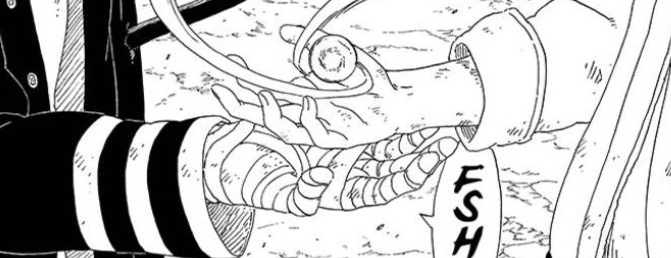The Brat and his Failure Father
On imperfect people and good families

Boruto is a brat; Naruto is an absentee parent.
These two assertions, both based on plot developed for the Boruto: The Naruto Movie and the arcs it inspired in the anime and manga, are oft-cited reasons as to why people don't like Boruto as a character or Boruto as a franchise. Both statements are rooted in the same perceived offense: Naruto himself, whether as a fictional character or as an actual parent, fails to receive the respect he deserves.
There is a kernel of truth in this: Naruto is never more human than when he is a parent.
We're originally introduced to Naruto as an ostracized orphan when his teacher, Iruka, champions his value as an individual and as a shinobi of the Leaf Village. Throughout the three year time span in which we follow his character arc, Naruto overcomes every stumbling block in front of him, including his personal flaws. He gains power, wins allies, and, even as a teenager, is strong enough to defy and destroy cycles of hatred, both within himself and in the shinobi world. Along the way, there are allies who believe in his dream, guiding him in his journey with wise words and encouragement.
However, when you look back on Naruto's story, you realize that none of these mentors were parents. By chapter 699 of Naruto, the entire village is prepared to support him as their future Hokage. Meanwhile, he has no mentors able to tell him how to be a spouse or parent.
In some ways, Boruto was right when he claimed that Naruto was raised without parents and doesn't know what it's like to have a family. But that's also a child's assertion of how he views family dynamics, much like a fan's assertion that Naruto is disrespected because he'd never be an absent parent. Neither grapple with the full experience of parenthood: We're all flawed people, we become flawed parents, and no one is there to save us from our own failings, both big and small.
Children observe their parents more closely than others do. Long before peers and friends hone our identities, it's our parents who show us how to be human. Naruto's story never had to grapple with the people involved in his early childhood years. There's no discussion of who changed his diapers or taught him to walk or put ice on his head when he bumped it or touched his forehead in the middle of the night when he was hot from a fever.
Logically, we know someone had to inhabit this role as no newborn baby, no toddler, no five-year-old is capable of staying alive without assistance, but the plot itself hand-waves his early life: Lord Third was supposed to take care of him, though we have no explanation of how that care took place or the relationship Naruto had with his caregivers. Those years are never mentioned.
Boruto's story is different, conceived of by the same author as Naruto, but viewed through the lens of an older man who is married and has had a child. Just as becoming a father influenced the writing of Naruto, inspiring Minato and Kushina to play a greater role in Naruto's own story, Kishimoto's experience of fatherhood also inspired the character of Boruto, a son bitter about his father's absence.
When it's debated whether Boruto is rightly termed a brat, whether his behavior early in the plot is warranted, the conversation often devolves into who was wronged: Naruto or Boruto. Should Naruto have been more present? Would Naruto have known his child needed him more? Should Boruto have understood his father's role as Hokage? Should he have recognized his father's responsibility and taken pride in his past?
I think the narrative holds the reader in higher regard than these debates, expecting them to take a more worldly approach to parent-child dynamics. Both Naruto and Boruto can be wrong; both of them can also be right. Rarely is life so cut and dry, especially when it comes to dynamics between a father and his preteen son.
While Boruto's reaction to Naruto's absence may seem overblown, especially after the introduction of Kawaki, a child who suffered abuse at the hands of his parents, it's also true that kind, well-meaning parents can hurt their children with their actions, and children with different personalities and at different ages will react differently to the world around them. We see this difference between Himawari and Boruto, the younger sister leaning more heavily on her mother for emotional support when she's disappointed while her older brother lashes out.
If you followed Naruto's story, you might view Boruto's attitude towards his father as deeply spoiled, being a child who grew up in a stable household with two living parents and a sibling. However, we don't know what Naruto's personality would have been like if his parents hadn't died, if he'd have been raised in the same role as Boruto, the son of a Hokage, longing for his father's recognition rather than the village's.
What we do know is that Naruto does know what it's like to have his own well-being placed below the safety of Konoha. Minato could have chosen to survive and raise him, but instead decided to leave him alone in the world with the nine-tailed fox sealed inside of him, a decision Naruto punched him for the first time they met. But unlike in Boruto, Naruto's parents are there to tell him he is loved and guide his use of the nine-tailed fox demon. The story lacks the natural conflict that comes from being raised by flawed people trying their best.
While Naruto is the story of a hero and his friends, Boruto feels as though it's a story of family, both at its best, as exemplified by the Uzumaki household, and at its worst in flashbacks to Kawaki's childhood.
Boruto respects Naruto by allowing him the space to be human, to make mistakes, and to be a father like most other fathers in the world, one who desperately wants to protect his child. But in Boruto's plot, like in real life, there are some things he's unable to protect his child from. Eventually, a parent needs to trust that they raised their child to embody their values and made them resilient enough to withstand the outside world.
We see Naruto's influence on his son in the closing chapter of Naruto: Next Generations when Boruto invokes his family as the source of his strength and resolve, his parents and their families inextricably tied up in his identity as a will-of-fire shinobi. Boruto demonstrates that parents don't need to be perfect in order to be good, and children can also grow, forgiving their parents' flaws and embodying their strengths.
